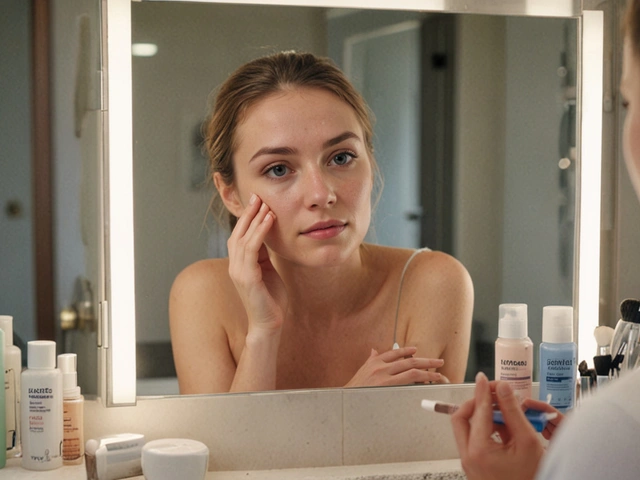Understanding Bacterial Eye Infections
Bacterial eye infections are a common problem that many people face, especially during the summer months when swimming in pools, lakes, and oceans becomes more frequent. These infections can be painful, irritating, and even dangerous if left untreated. In this article, we will discuss the different types of bacterial eye infections, their causes, and how you can protect yourself while swimming. So, let's dive right in and learn more about this common issue.
Types of Bacterial Eye Infections
There are several different types of bacterial eye infections that can be contracted while swimming, including conjunctivitis (pink eye), keratitis, and endophthalmitis. Conjunctivitis is an inflammation of the conjunctiva, the thin protective membrane that covers the whites of your eyes and the inside of your eyelids. Keratitis is an inflammation of the cornea, the clear front part of the eye responsible for focusing light onto the retina. Endophthalmitis is a rare but severe infection that affects the inner layers of the eye and can cause blindness if not treated promptly.
Causes of Bacterial Eye Infections
Bacterial eye infections can be caused by various types of bacteria, such as Staphylococcus, Streptococcus, and Pseudomonas aeruginosa. These bacteria can be found in various water sources, including swimming pools, hot tubs, lakes, rivers, and oceans. When you swim, these bacteria can enter your eyes and cause an infection if you have a small scratch or irritation on your eye's surface. Factors such as wearing contact lenses while swimming, having a weakened immune system, or having a history of eye infections can put you at a higher risk of developing a bacterial eye infection.
Recognizing the Symptoms
It's essential to recognize the symptoms of a bacterial eye infection so that you can seek treatment as soon as possible. Symptoms can vary depending on the type of infection but may include redness, swelling, itching, burning, discharge, or blurred vision. If you experience any of these symptoms after swimming, it's crucial to consult with a healthcare professional to determine the cause and receive appropriate treatment. Don't ignore these symptoms, as untreated bacterial eye infections can lead to more severe complications and even vision loss.
Preventing Infections While Swimming
Fortunately, there are several steps you can take to reduce your risk of developing a bacterial eye infection while swimming. First, always wear goggles to protect your eyes from bacteria and other irritants in the water. Make sure your goggles fit correctly and create a tight seal around your eyes to prevent water from entering. If you wear contact lenses, avoid wearing them while swimming, as they can trap bacteria against your eye and increase your risk of infection. Instead, consider wearing prescription goggles or daily disposable lenses that you can discard after swimming.
Treating Bacterial Eye Infections
If you suspect that you have a bacterial eye infection, it's essential to seek treatment promptly. A healthcare professional will likely prescribe antibiotic eye drops or ointment to treat the infection. Be sure to follow your healthcare provider's instructions carefully and complete the full course of treatment, even if your symptoms improve before the medication is finished. This helps ensure that the infection is fully treated and reduces the risk of recurrence or complications.
Importance of Pool Maintenance and Hygiene
Proper pool maintenance and hygiene play a crucial role in preventing bacterial eye infections. Public pools and hot tubs should be regularly tested and treated with chlorine or other disinfectants to kill bacteria and other pathogens. As a swimmer, you can also help prevent the spread of bacteria by showering before entering the pool, avoiding swimming when you have an active eye infection, and refraining from urinating in the pool. By taking these simple precautions, we can all enjoy a safer and healthier swimming experience.











Oliver Bishop April 29, 2023
Our great nation should demand stricter pool sanitation standards to keep our eyes safe while swimming!
Alissa DeRouchie April 29, 2023
Wow this article really tries to scare us but honestly who even reads the fine print of pool maintenance? I mean the water is water and if you get a splash you’re fine lol. Still, ignoring bacterial threats is just reckless, you know?
Emma Howard April 30, 2023
Totally agree – taking a quick goggles check before the dive can save a lot of hassle! Let’s all keep our eyes healthy and enjoy the splash! 🌊
dee gillette April 30, 2023
While the article provides a thorough overview, it overlooks that many modern filtration systems already mitigate the majority of bacterial risks, rendering some of the cautions somewhat excessive.
Jasin P. April 30, 2023
Oh, sure, because everyone’s first thought after a pool dip is to philosophize about chlorination levels – right?
Lily Đàn bà April 30, 2023
Enough with the complacency! The moment you trust a pool’s “clear” look you’re inviting a microscopic invasion that could blind you – it’s a national disgrace!
Joseph O'Sullivan April 30, 2023
Look, the philosophical angle aside, the simple truth is that water isn’t sterile; a tiny scratch can become a gateway for infection, so wear those goggles.
Conor McCandless April 30, 2023
Swimming in a public pool is a pastime that many cherish as a communal ritual of summer joy It is also an activity that harbors hidden dangers that are often dismissed as mere inconveniences The bacteria that thrive in warm, chlorinated water are remarkably resilient and can attach themselves to the surface of contact lenses creating a perfect storm for infection The cornea, being the most exposed part of the eye, is especially vulnerable when a swimmer rubs their eyes after a dive The resulting keratitis can progress rapidly, leading to pain, blurred vision, and in severe cases permanent scarring The article rightly emphasizes goggles as a primary defense, yet the market offers a vast array of prescription and anti-fog options that combine safety with visual clarity Moreover, the practice of showering before entry not only reduces organic load but also signals respect for communal hygiene standards Many swimmers remain unaware that even a brief exposure to a poorly maintained hot tub can introduce Pseudomonas aeruginosa, a pathogen notorious for its resistance to treatment Therefore, regular pool testing, proper chlorine levels, and prompt reporting of any eye irritation are essential steps in safeguarding public health Finally, the responsibility lies not solely with facility operators but also with individuals who must resist the temptation to swim while wearing contact lenses or when already suffering from a mild eye irritation By embracing these precautionary measures, we preserve the simple pleasure of diving into the water without compromising our vision The cumulative effect of these habits can dramatically lower the incidence of bacterial eye infections across the nation
kat gee April 30, 2023
That’s a solid rundown – keep your eyes covered and you’ll stay in the game!
Iain Clarke April 30, 2023
In many cultures, pool etiquette extends beyond personal hygiene; teaching children the habit of rinsing off and using goggles early on builds lifelong awareness that benefits community health.
Courtney Payton April 30, 2023
While education is vital, it’s equally important to acknowledge that some pools neglect proper disinfection, making personal vigilance the last line of defense.
Muthukumaran Ramalingam April 30, 2023
Honestly I think people overthink this whole thing – sure, bacteria are out there but if you’re not swimming every day you probably won’t get a full blown infection the risk is there but it’s not the end of the world just remember to wash your hands after you get out and maybe skip the contacts if you can it’s a simple trade off for peace of mind
Garrett Williams April 30, 2023
Exactly, a quick rinse and ditching contacts for a swim can keep you safe without any drama.
joba alex April 30, 2023
From a biofilm perspective, the ocular surface acts as a substrate for microbial colonization especially under suboptimal chlorine residuals, which contradicts the simplistic narrative presented.
Rene Lacey April 30, 2023
The nuance you bring is appreciated; however, for the average swimmer, actionable advice matters more than microbial mechanics.
johnson mose April 30, 2023
Let’s strike a balance – we can enjoy the water, respect pool guidelines, and still keep an eye on personal safety without turning every dip into a medical seminar.
Charmaine De Castro April 30, 2023
Agreed, a friendly reminder to check goggles fit and avoid swimming when you have any eye irritation goes a long way.
Mark Mendoza April 30, 2023
Bottom line: protect your eyes, follow pool hygiene, and you’ll keep the splash fun – 😎